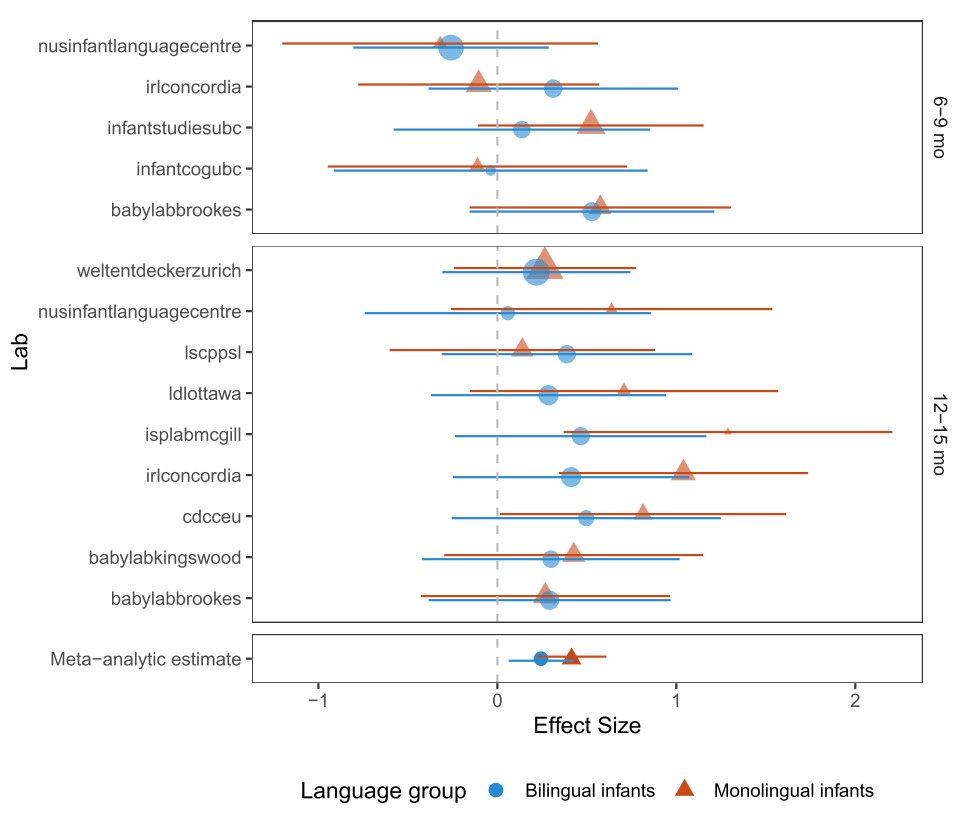
Project Overview
- Status: COMPLETE
- 17 participating labs collected data in 7 countries
- 333 bilingual infants tested (in addition to 384 monolingual infants from MB1 sample)
- 38 authors on AMPPS publication
![]() In this project we used the diversity of bilingual infant experiences to explore the impact of different types of linguistic experience on infants’ Infant Directed Speech (IDS) preference over Adult Directed Speech (ADS). We compared lab-matched samples of 333 bilingual and 384 monolingual infants’ preference for North-American English IDS, tested in 17 labs in 7 countries. Those infants were tested in two age groups: 6–9 months and 12–15 months.
In this project we used the diversity of bilingual infant experiences to explore the impact of different types of linguistic experience on infants’ Infant Directed Speech (IDS) preference over Adult Directed Speech (ADS). We compared lab-matched samples of 333 bilingual and 384 monolingual infants’ preference for North-American English IDS, tested in 17 labs in 7 countries. Those infants were tested in two age groups: 6–9 months and 12–15 months.
We found that bilingual and monolingual infants preferred IDS to ADS, and did not differ in terms of the overall magnitude of this preference. However, amongst bilingual infants who were acquiring North-American English (NAE) as a native language, greater exposure to NAE was associated with a stronger IDS preference, extending the previous finding from MB1 that monolinguals learning NAE as a native language showed a stronger preference than infants unexposed to NAE.

Together, our findings indicate that IDS preference likely makes a similar contribution to monolingual and bilingual development, and that infants are exquisitely sensitive to the nature and frequency of different types of language input in their early environments.
Links
- Materials, Protocols, and Documentation: MB1B-OSF.
- Data and code: MB1B-GitHub.
- Listserv: join here.
- News: MB1B-news.
Project Lead
- Krista Byers-Heinlein, Concordia University, Canada [email]
MB1B Contributors
NOTE: Default table ordering is by contributor’s first name. You can filter, group, and/or sort entries by any field.
Publication
Byers-Heinlein, K., Tsui, A. S. M., Bergmann, C., Black, A. K., Brown, A., Carbajal, M. J., Durrant, S., Fennell, C. T., Fiévet, A.-C., Frank, M. C., Gampe, A., Gervain, J., Gonzalez-Gomez, N., Hamlin, J. K., Havron, N., Hernik, M., Kerr, S., Killam, H., Klassen, K., … Wermelinger, S. (2021). A multi-lab study of bilingual infants: Exploring the preference for infant-directed speech. Advances in Methods and Practices in Psychological Science, 3(1), 24–52. https://doi.org/10.1177/2515245920974622 [PsyArXiv preprint]